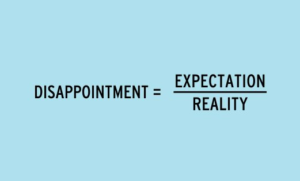 Let’s talk disappointment. That “wa-wa-waaaa” feeling of being let down. Where does it come from and how do we deal with it once it happens?
Let’s talk disappointment. That “wa-wa-waaaa” feeling of being let down. Where does it come from and how do we deal with it once it happens?
Disappointment stems from an unmet expectation. Yes, it’s really that simple. Someone tells you they will do something for/with you, you expect them to follow through, and you get disappointed. You work exceptionally hard on a project, expect accolades, don’t get them, and get disappointed. You find a tub of your favorite ice cream, expect it to taste marvelous, but it’s freezer burned, and you’re disappointed. Because disappointment is tied directly to expectations, it makes sense to define what an expectation is. An expectation is “a strong belief that something will happen or be the case in the future.”[1] It’s a learned behavior based on past events. If someone makes you breakfast every single morning, you will come to expect that person to continue to make you breakfast every single morning. AND, when they don’t do it that one time, you get disappointed and your trust in that person will take a hit.
Disappointment hits our trust and breaks it just a little. You’ll definitely think twice about asking that friend who flaked to help you with something or eating that flavor of ice cream unless freshly purchased due to the past disappointment. Our society continues to be more and more expectation based, so much so that many of our youth are turning into entitled adults because they are expecting things to be as easy in adulthood as they were growing up. Why then, are we setting ourselves up for disappointment? It’s not a pleasant feeling; it doesn’t make us happy. What is the function of disappointment??
Disappointment exists to offer us a chance at self-reflection. To really dig deep down and find out why that expectation exists in the first place, to re-calibrate those expectations to meet your reality. Disappointment can be a good thing, if you think about it. It helps us stop feeling so entitled at what we think we’re owed. It helps us be more aware and more in tune with those around us.
So, what are some ways you can deal with disappointment?
First, acknowledge you are disappointed and figure out why. Are you really disappointed in your ice cream because it’s freezer burned (“bad, freezer!”) or are you upset with yourself for forgetting about it to begin with? Acknowledge your disappointment, unravel why you’re disappointment, and feel the disappointment!
Second, don’t take it personally! The world owes you nothing! Your breakfast gets made every morning from the goodness of that person’s heart, not because they owe you breakfast. Your friend who didn’t follow through originally offered to help because they love you and want to help take care of you, not because they owe you. Realizing that you are not owed the world will help deal with the disappointment.
Finally, look at the big picture. Were your expectations realistic? Maybe you need to take stock of what your expectations are and whether or not they can be realistically met. Perhaps your expectations need to be edited to match what can realistically happen. Look at the bigger picture and adjust.
Disappointment, as you can see, can be quite useful. It’s what you make of it that matters.
Read more about it:
http://www.katemarolt.com/how-to-deal-with-disappointment/
http://blog.terrificwords.com/bright-side-disappointment/
http://www.officer.com/article/11298266/make-the-most-of-disappointment
